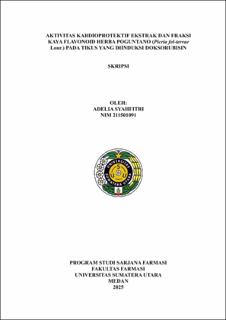| dc.description.abstract | Background: Doxorubicin is one of the drugs used in cancer therapy, but has side effects that can produce compounds that are toxic to heart cells. Poguntano herb (Picria fel-terrae Lour.) contains many flavonoid compounds and strong antioxidant properties that can play a role in protecting the heart from the side effects of doxorubicin use.
Objective: To determine the effect of flavonoid-rich extract or fraction of poguntano herb (Picria fel-terrae Lour.) as cardioprotector in doxorubicin-induced male rats.
Methods: This study was conducted experimentally with research stages including the preparation of simplisia, making ethanol extract of poguntano herb with reflux method using 70% ethanol solvent, characterization of simplisia and extracts, phytochemical screening of simplisia and extracts, making fractions, testing the total flavonoid content of extracts and fractions, and testing on experimental animals. Rats were divided into 6 treatment groups, namely, control positive quercetin 50 mg/kg BW, control negative CMC-Na 0.5%, and the remaining extract and fraction of poguntano herb in doses of 50, 100, 200, and 400 mg/kg BW. Mice were given oral treatment for 9 days. On days 8 and 9, doxorubicin 10 mg/kg BW was administered i.p. on day 10. On the 10th day, blood was taken from the heart of rats and centrifuged to obtain blood and serum for histology, hematology and measurement of LDH levels.
Results: Based on the results of the study, the highest total flavonoid content was found in the residual fraction of poguntano herb which amounted to 65.011mg QE/g. Doses of 50, 100, 200 and 400 mg/kgBB were able to improve hematological parameters in the blood of doxorubicin-induced rats compared to the negative control group. Doses of 50, 100, 200, and 400 mg/kgBB were also able to reduce the value of lactate dehydrogenase parameters compared to the negative control. Dose of 400 mg/kgBB is known to have the strongest activity to reduce the value of LDH with a value of 476.8 ± 4.44 U/L in male rats induced by doxorubicin. The heart organ in the negative control group of doxorubicin 10 mg / kgBB there is damage to myocardial cells in the form of severe necrosis and there is severe bleeding. FSHP 400 mg/KgBB was found to have a better effect in protecting the heart against cardiomyocytes in myocardial cells characterized by repair and an increase in the number of normal cells in the myocardium.
Conclusion: The residual fraction of poguntano herb has cardioprotective activity against doxorubicin-induced rats. | en_US |


